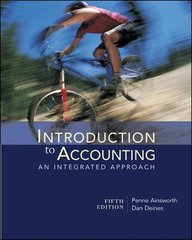Question
Six years ago, Darby purchased land as an investment. The land cost $160,000 and is now worth $410,000. Darby plans to transfer the land to
Six years ago, Darby purchased land as an investment. The land cost $160,000 and is now worth $410,000. Darby plans to transfer the land to Baxter Corporation, which will subdivide it and sell individual tracts. Baxter's income on the land sales will be ordinary in character.
Requirement a. What are the tax consequences of the asset transfer and land sales if
Darby
contributes the land to
Baxter
in exchange for all its stock?
| Darby recognizes | on the transfer of land to Baxter Corporation. |
| Baxter's basis in the land will be | . All gain on the subsequent sales will be | ordinary income | |
| to Baxter. |
| This alternative results in the | that accrued prior to Darby's transfer and the | |
| earned from subdividing the land |
Requirement b. In what alternative ways can the transaction be structured to achieve more favorable tax results? Assume
Darby's
marginal tax rate for capital gains is
23.8%
(20%
+
3.8%
on net investment income), and
Baxter's
tax rate is
21%.
A.
Darby
could elect out of the Sec. 351 provisions. By including an election with her timely filed income tax return in the year of the transfer,
Darby
can avoid the Sec. 351 provisions.
B.
Darby
could find another investor who is willing to contribute property valued at
$160,000
in exchange for 50% of the stock of the corporation.
C.
There are no alternatives that will allow
Darby
to avoid Sec. 351.
D.
Darby
could transfer the land to
Baxter
in exchange for stock and debt instruments equal to her realized gain. In this case,
Darby
would recognize a long-term capital gain and
Baxter's
basis in the land would be the FMV of the land. The pre-contribution capital gain (net of any capital losses that
Darby
has recognized) is taxed at the applicable capital gains tax rate (in this case,
23.8%,
including the
3.8%
net investment tax). The step-up in basis permits
Baxter
to use the additional basis to offset income earned from subdividing the land that otherwise would be taxed at a
21%
marginal tax rate.
Step by Step Solution
There are 3 Steps involved in it
Step: 1

Get Instant Access to Expert-Tailored Solutions
See step-by-step solutions with expert insights and AI powered tools for academic success
Step: 2

Step: 3

Ace Your Homework with AI
Get the answers you need in no time with our AI-driven, step-by-step assistance
Get Started


